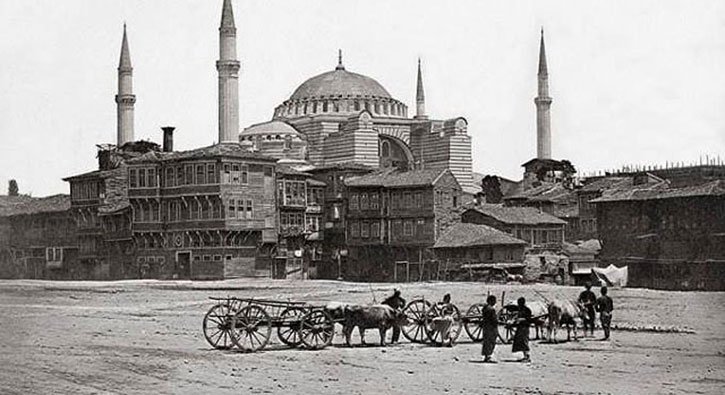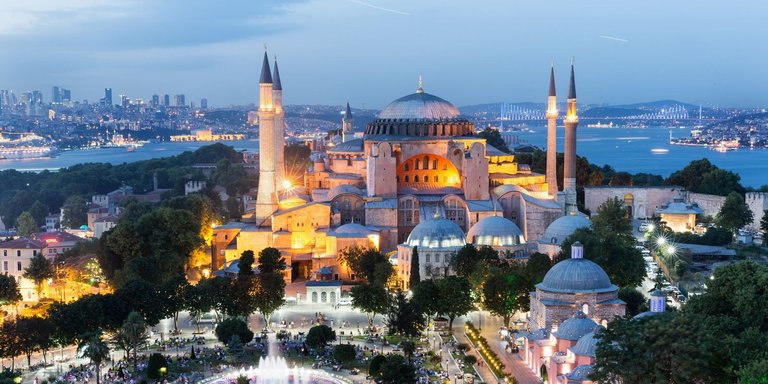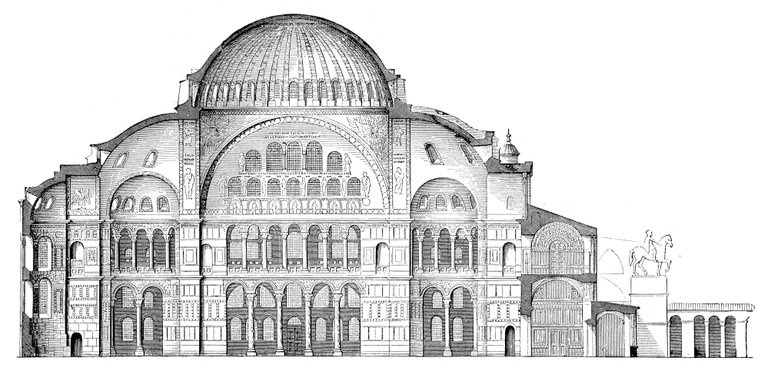
Hagia Sophia, one of the most important monuments of the world's architectural history, survived to the present day; architecture, magnificence, size and functionality of the art world is an important place in terms of.
Haghia Sophia was the largest church in the Eastern Roman Empire in Istanbul and was built three times in the same place. It was first named Megale Ekklesia (Great Church) and from the 5th century it was defined as Hagia Sophia (Sacred Wisdom). Hagia Sophia has served as the cathedral, the largest church of the capital, crowned by monarchs throughout the Eastern Roman Empire.
The first church was built in 360 by the Emperor Constantios (337-361). The first building with a basilical plan covered with wooden roof was burned and destroyed as a result of the popular uprising in 404 due to the dispute between the Emperor Eudoksia and the Patriarch Ioannes Chrysostomos of the Emperor Arkadios (395-408). (Today the mosaic of your patriot can be seen on the northern tymphanon wall of Hagia Sophia.)
Today, there are no relics belonging to the first church, but Megale Ekklesia in the museum deposit is thought to belong to this structure with stamped bricks.
Second Church, Emperor II. It was rebuilt in 415 by Theodosios (408-450). It is known that this structure is a basilical planar with five naves, a wooden roof, and a monumental entrance.
During the great reign of the Emperor Justinianos (527-565) in the 5th year of the Soviet era, a large popular uprising that resulted in the merging of the blues representing the aristocratic segment and the greenery representing the tradesmen and merchants segment against the Empire, It was destroyed in the year.
In the excavations carried out by A. M. Scheinder of the German Archaeological Institute of Istanbul in 1935, The steps of the propylon (monumental entrance gate), column bases and frieze fragments decorated with lamb reliefs representing the Twelve Apostles were found. Other architectural pieces belonging to the monumental entrance can also be seen in the western part of the garden.

The present day Hagia Sophia was built by Emperor Justinianos (527-565), two important architects of the time, Miletos (Miletus) Isidoros and Tralles (Aydın) Anthemios. According to the historian Prokopios, the building, which started on 23 February 532, was completed in a short period of 5 years and the church opened a ceremony in the ceremony on 27 December 537. In the sources, after the opening day of Hagia Sophia, Emperor Justinianos said, "Thank God for giving me the opportunity to make such a place of worship," after entering into the temple, Solomon refers to the Word and says, "O Sulaiman I passed you".
Innovation in the architecture of the third Hagia Sophia is to bring together the traditional basilical plan and the central dome plan. There are three nephi, one apsi, two internal and external narthexes. Apsisten is 100 m in length up to external nartekse. width is 69.50 m. The height of the mound is 55.60 m above sea level, its diameter is 31.87 m in north-south direction and 30.86 m in east-west direction.
The Emperor Justinianos ordered Hagia Sophia to be confiscated for use in Hagia Sophia by sending news to all the provinces in order to make it more spectacular and spectacular. The columns and marbles used in this structure; Aspendos, Ephesos, Baalbek, Tarsus were brought from the ancient city of Anatolia and Syria. The white marbles in the building were used in the Marmara Island, the green ones in Euboea Island, the pink marbles in Afyon and the yellow marbles were brought from North Africa and used in Hagia Sophia. In the interior walls of the building; symmetrical shapes were uncovered by dividing the marbles into two blocks in a single block and a decorative richness was created by the use of marble colored marble in the interior. It is also known that the columns brought from the Temple of Ephesus Artemis in the structure were used in the naves, and the eight porphyry columns brought from Egypt were used under half domes. There are a total of 104 columns, 40 of which are in the lower gallery and 64 of which are in the upper gallery.

All surfaces outside the marble covered walls of Hagia Sophia are adorned with beautiful mosaics. Materials made of gold, silver, glass, terracotta and colored stones were used in making the mosaics. Herbal and geometric mosaics in the building are dated to the 6th century, and the depicted mosaics are dated after the ikonaklazma (Describing Period 730-842).
Hagia Sophia was the site of the coronation ceremonies of the Emperors due to being the Imperial Church in the Eastern Roman period. For this reason, the omphalion, rounded and colored with colored stones, to the right of the main place (naos) in Hagia Sophia, is the department of the Eastern Roman Emperors.


Congratulations @ibraten! You have completed some achievement on Steemit and have been rewarded with new badge(s) :
Click on any badge to view your own Board of Honor on SteemitBoard.
For more information about SteemitBoard, click here
If you no longer want to receive notifications, reply to this comment with the word
STOPEllerine sağlık hocam, güzel paylaşım.
Teşekkürler Hocam
Başarılı İbrahim ağabey. Ellerine sağlık. Yeni çalışmalarında Başarılarının devamını dilerim.
Sağol Kardeşim seninde çalışmaların çok başarılı
I found your post and decided to help you get noticed.
I will pay a resteeming service to resteem your post,
and I'll give you my stamp of automatic approval!
Curious?
introduction post
Check out the great posts I already resteemed.Resteemed by @resteembot! Good Luck! The resteem was payed by @greetbot The @resteembot's Get more from @resteembot with the #resteembotsentme initiative